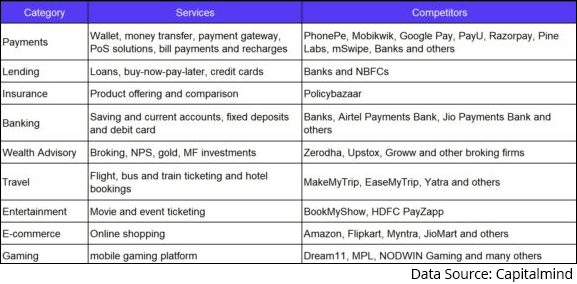- Home
- Views On News
- Oct 30, 2021 - Paytm IPO: Key Things to Know About India's Biggest IPO
Paytm IPO: Key Things to Know About India's Biggest IPO

The Indian primary market will witness two of the busiest weeks in its history as seven companies have lined up to together to raise over Rs 315 bn by 10 November.
This will have major implications.
Retail investors might want to participate in the initial public offers (IPOs), and they could offload money from their portfolios and divert it into IPOs.
The good thing news is that we could see huge foreign flows.
Out of the seven issues lined up, the most hyped and talked about is India's biggest IPO by One 97 Communications, operating under the Paytm brand.
Here are some details about India's biggest IPO.
Issue period: 8 November 2021 to 10 November 2021
IPO Size: Rs 183 bn - The issue is an offer for sale (OFS) for Rs 100 bn and fresh issue worth Rs 83 bn.
In this issue, 75% will be reserved for Qualified Institutional Buyers (QIBs), 15% for non-institutional investors (NIIs) and the remaining 10% for retail investors.
Price band: Rs 2,080 to Rs 2,150 per equity share
Bid lot: 6 shares and in multiples thereof. Retail investors can apply for a maximum of 15 lots (90 shares) which will amount to Rs 193,500.
Face value: Rs 1 per equity share
Object of the issue:
- Rs 43 bn towards growing and strengthening Paytm ecosystem
- Rs 20 bn towards investing in new business initiatives, acquisitions, and strategic partnerships
- General corporate purposes
A bit of history of India's leading fintech firm...
Incorporated in 2000, Paytm's parent One 97 Communications is India's leading digital ecosystem for consumers as well as merchants.
As of March 2021, the company had more than 333 m client base and around 21 m registered merchants to whom it offers payment services, financial services, and commerce and cloud services.
The company's name 'Paytm' has become for payments what 'Google' is to internet search.
Paytm is available across the country with 'Paytm karo' evolving into a verb for hundreds of millions of Indian consumers, shopkeepers, merchants, and small businesses.
Paytm is the only payments company in India that, together with their affiliates, owns each layer of the payment stack. It offers services such as Paytm Wallet, Paytm QR, Paytm Soundbox, Gold investments and Fixed Deposit, Paytm Postpaid, Merchant Cash Advance. and FASTag.
Factors in favor of Paytm
India's leading digital payment service platform
Being India's leading digital ecosystem for consumers and merchants, Paytm has built the largest payments platform based on the number of consumers, number of merchants, number of transactions, and revenue as of March 2021.
Driven by mobile payments, India's payment landscape has transformed over the last decade. Unique online transacting users, transacting for services are expected to grow from 250 - 300 m in fiscal 2021 to 700 - 750 m by fiscal 2026.
Brand + huge customer base
In 2009, the company launched the first digital mobile payment platform, 'Paytm App' to offer cashless payment services to customers.
Skip forward to present, it has now become India's largest payment platform and the most valuable payments brand with a total brand value of US$6.3 bn.
Paytm has a huge customer base of 333 m people and over 21 m registered merchants.
Increasing pace of digitization
India is a country of hundreds of millions of young and aspiring consumers who are underserved in payments and financial services products. So Paytm has a large addressable market in India.
Also, the Indian financial services market is underpenetrated but with increasing smartphone penetration and internet usage, India's digital ecosystem is at an inflection point.
Digital commerce in India is expected to grow over 3.3 times in the next 5 years to more than US$300 bn in financial year 2026 from approximately US$90 bn at present.
Tech factor
Even though Paytm, like Zomato, is loss making, investors are looking beyond the financial situation of these tech firms. The loss making Zomato's IPO was oversubscribed 38 times.
Most of the interest in these companies is based on metrics like growth in user base, quality of user engagement, and net revenues.
Paytm has all boxes ticked in terms of user base, quality engagement, and revenues.
Risk factors
High dependence on payment services
Transaction fees from merchant payment services account for 75% of Paytm's revenues.
Currently payment operators cannot charge merchant discount fees (MDR) on UPI and RuPay debit transactions. UPI is increasingly displacing other forms of digital payments in the ecosystem. Further changes to MDR as well as payment channel preferences can impact the business.
Merchant and consumer ecosystem
Paytm's business is heavily dependent on its merchant ecosystem with merchant fees across payments, commerce, cloud, and fintech services contributing heavily to its revenue.
Merchant contracts range between six months and five years and the terms of such contracts allow these merchants to terminate the contracts without cause.
So, loss of merchant base could put Paytm's business at risk.
A similar risk exists with its customer base where failure to attract new customers or loss of existing customer base can impact Paytm's business performance.
Paytm Payments Bank
A bulk of the payment instruments or channels on the Paytm platform, such as Paytm Wallet, Paytm UPI, NACH, Paytm FASTag, and Fixed Deposits are offered by Paytm Payments Bank.
Vijay Shekhar Sharma owns 51% equity stake in the payments bank and One97 Communications holds the rest.
If Paytm Payments Bank fails to comply with laws, regulations, or policies, or loses its licenses, and as a result is unable to provide services then the Paytm suite of fintech solutions are likely to suffer an impact.
Intense competition
Paytm competes with a diverse range of businesses due to its large portfolio.
It has spent billions into spreading itself into a variety of business segments including insurance sales, wealth management, digital gold, travel, and movie ticketing, fantasy sports, e-commerce, etc.
From payments banks, payment system operators, UPI apps and wealth management platforms, the company goes up against the likes of Airtel, Reliance Jio, WhatsApp, MobiKwik, BillDesk, Google, PhonePe, and many others.
Paytm has specifically noted that some of its competitors may get licenses that may hinder Paytm's ability to offer certain services.
Paytm's Competitors

Policy risks
Recently, the RBI has issued guidelines on regulation of Payment Aggregators and Payment Gateways, 2020 requiring existing providers of payment aggregator and gateway services to apply for an authorisation from the RBI by 31 December 2021.
These guidelines also stipulate that a single entity cannot provide an ecommerce marketplace (as in case of Paytm Mall) along with payment aggregator services. To comply with the requirements Paytm has applied for authorisation of its payment subsidiary.
It has also stated that while NPCI's 30% transaction caps do not apply to its platform at present, any updates in the requirements can impact business.
Negative cash flows
The digital payments platform has had negative cash flows from operating activities for fiscals 2020 and 2021 and in the three months ended June 2020.
The financials
Paytm has been a loss-making company. That is because of its high-cost base.
However, the company has meaningfully reduced its costs over the years. A major part of this cost reduction is on the back of lower cashback and incentives.
The company's chief executive and founder Vijay Shekhar Sharma had told that Paytm may turn profitable this year due to an increase in the use of its payment platforms during the pandemic.
For the first three months of this fiscal year, Paytm's revenues were up 46% to Rs 9.5 bn as against Rs 6.5 bn in the same quarter last fiscal.
Paytm's losses stood at Rs 3.8 bn for the three months ended June 2021.
Paytm Key Financials
| Year Ended | 3 Months Ended | ||||
|---|---|---|---|---|---|
| (Rs m) | 19-Mar | 20-Mar | 21-Mar | 20-Jun | 21-Jun |
| Revenues | 35,797 | 35,407 | 31,868 | 6,494 | 9,480 |
| Revenue Growth (%) | - | -1.10% | -10.00% | - | 46.00% |
| Expenses | 77,439 | 61,382 | 47,830 | 9,333 | 13,123 |
| Net Loss | -42,309 | -29,424 | -17,010 | -2,844 | -3,819 |
Paytm's bet on financial services has passed with flying colors as it contributed almost 80% of the revenues.
The key driver of Paytm's revenue is the gross merchant volume (GMV) that is processed in its platforms and the average commission it earns on the same. It defines GMV as total payments made to merchants using Paytm products. It does not include any consumer-to-consumer money transfers.
Paytm has scaled down its marketing expenses over the last two years. These spends refer to cashback/incentives given to users to maintain a higher market share.
For more details, check out Paytm's RHP.
Addressing the IPO frenzy around us...
The IPO frenzy seems to have taken the driver's seat as internet and tech companies are chasing money in this bull market.
About Rs 450 bn worth of issuances are hitting the market in the October to December period.
Sure, this IPO frenzy has raised many questions.
The multiple-times oversubscription we have seen in recent times boggles our mind and defies logic.
What retail investors should do in these situations is to invest in IPOs with a long-term perspective and not just for the listing gains.
Talking about the Paytm IPO, valuation guru Aswath Damodaran in a blog post had said the company should be valued at US$19.60 bn at best, which was at a 26% discount to the prevailing price range in the grey market.
But all being said, from a start-up offering simple digital wallet business to now the largest payments and fintech ecosystem in India, Paytm's journey is remarkable.
It's being touted as India's most valuable startup.
Paytm IPO will be at US$19.5 bn to US$20 bn valuation. At these valuations, it will rank higher than many of the Sensex companies upon listing.
Speaking of Paytm IPO, here's what Richa Agarwal, lead small cap analyst at Equitymaster, wrote in an edition of Profit Hunter...
- I'm a big admirer of these companies as a consumer.
However, looking at them through an investor's lens, I'm sceptical. These successful disruptors aren't anti-fragile themselves.
In a world of cheap money and deep pocketed private investors willing to burn cash on promising ideas, they are facing brutal competition.
Their only chance of survival is their ability to raise more money. Hence the IPOs.
Meanwhile, in a similar vein, Co-head of Research at Equitymaster, Tanushree Banerjee talked about start-ups and how India is emerging as the hotbed of tech unicorns, in one of her videos.
She discussed whether Zomato and Paytm are set to be the next Microsoft and Apple.
Happy Investing!
Disclaimer: This article is for information purposes only. It is not a stock recommendation and should not be treated as such. Learn more about our recommendation services here...

Yash Vora is a financial writer with the Microcap Millionaires team at Equitymaster. He has followed the stock markets right from his early college days. So, Yash has a keen eye for the big market movers. His clear and crisp writeups offer sharp insights on market moving stocks, fund flows, economic data and IPOs. When not looking at stocks, Yash loves a game of table tennis or chess.


Equitymaster requests your view! Post a comment on "Paytm IPO: Key Things to Know About India's Biggest IPO". Click here!
Comments are moderated by Equitymaster, in accordance with the Terms of Use, and may not appear
on this article until they have been reviewed and deemed appropriate for posting.
In the meantime, you may want to share this article with your friends!